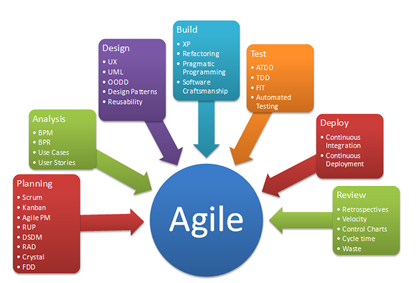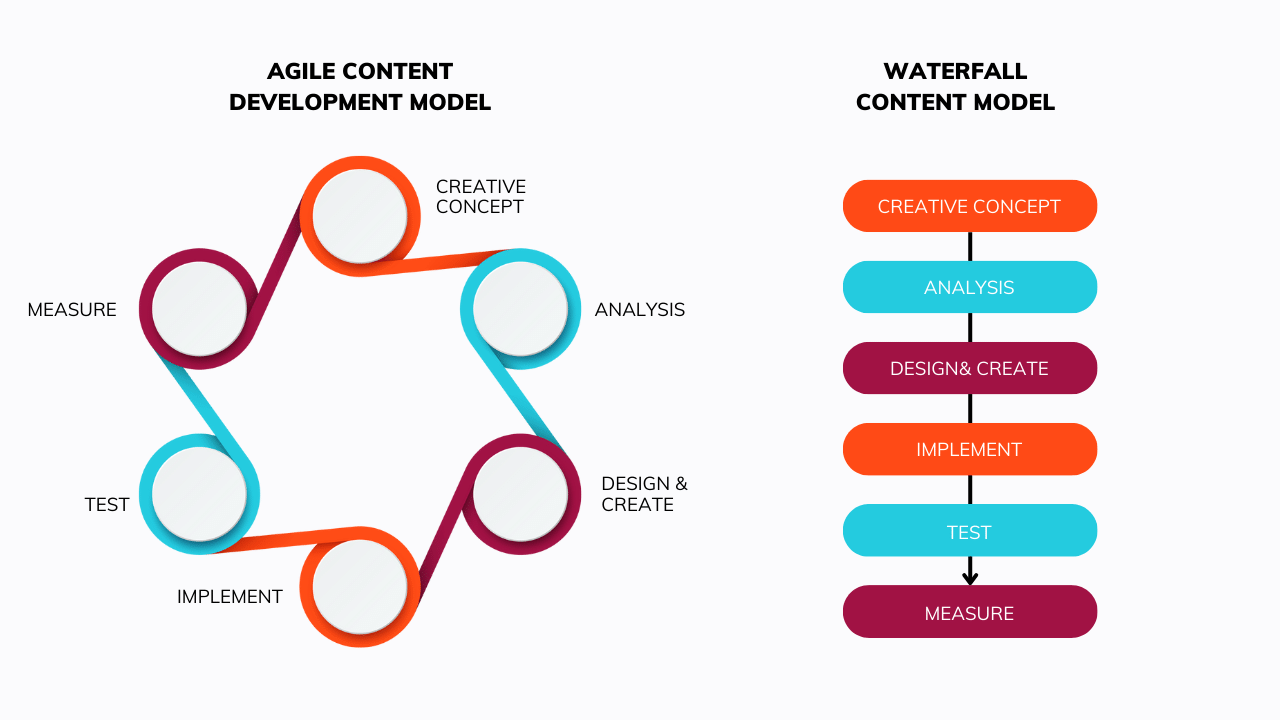In the ever-evolving landscape of content marketing, the Agile methodology stands out as a dynamic and adaptable approach to achieving success in a rapidly changing digital environment. Rooted in the principles of flexibility, collaboration, and iterative improvement, Agile methodology revolutionizes the traditional content creation process, empowering teams to respond swiftly to shifting market demands and audience preferences. This exploration delves into the core principles and practices of Agile methodology in content marketing, illuminating its transformative impact on strategy, execution, and outcomes.
1. Understanding Agile Methodology
At its core, Agile methodology is a mindset that prioritizes adaptability, collaboration, and continuous improvement in the pursuit of organizational objectives. Originally developed for software development, Agile principles have since been embraced across diverse industries, including content marketing, as a means of fostering innovation and agility in the face of uncertainty and complexity.
2. Core Principles of Agile Methodology
Agile methodology is guided by a set of core principles that emphasize customer collaboration, iterative development, and responsiveness to change. These principles include:
- Customer Collaboration over Contract Negotiation: Agile methodology prioritizes ongoing collaboration and communication with customers and stakeholders, enabling teams to align their efforts with evolving needs and expectations.
- Iterative Development and Delivery: Agile teams break down projects into smaller, manageable increments, known as iterations or sprints, allowing for continuous feedback and refinement throughout the development process.
- Embracing Change: Rather than viewing change as a disruption, Agile methodology embraces change as an opportunity for growth and adaptation, empowering teams to pivot and adjust course in response to new information or market dynamics.
3. Applying Agile Methodology to Content Marketing
In the realm of content marketing, Agile methodology offers a transformative framework for optimizing strategy, execution, and outcomes. By embracing Agile principles and practices, content marketing teams can streamline workflows, enhance collaboration, and deliver value to their audiences more effectively.
Related Blogs: What is interactive content creation?
4. Agile Content Strategy
At the heart of Agile content marketing lies a flexible and data-driven approach to strategy development. Agile teams leverage market research, audience insights, and analytics data to inform their content strategy, prioritizing high-impact initiatives and iterating based on performance metrics and feedback.
Related Blogs: What are Content marketing strategies?
5. Iterative Content Development
Agile content development is characterized by its iterative and collaborative nature. Rather than pursuing lengthy, monolithic projects, Agile teams break down content initiatives into smaller, more manageable tasks, allowing for rapid prototyping, testing, and refinement.
6. Continuous Feedback and Optimization
A hallmark of Agile methodology is its emphasis on continuous feedback and optimization. Throughout the content development process, Agile teams solicit input from stakeholders, analyze performance data, and iterate on content based on user engagement and conversion metrics.
7. Cross-Functional Collaboration
Agile content marketing thrives on cross-functional collaboration and communication. By breaking down silos between departments and fostering a culture of transparency and accountability, Agile teams can leverage the diverse expertise and perspectives of team members to drive innovation and excellence in content creation.
8. Agile Tools and Technologies
In support of Agile content marketing initiatives, a variety of tools and technologies have emerged to facilitate collaboration, workflow management, and performance tracking. From project management platforms to content optimization tools, Agile teams leverage technology to streamline processes and enhance productivity.
9. Benefits of Agile Methodology in Content Marketing
The benefits of Agile methodology in content marketing are manifold. By embracing flexibility, collaboration, and iterative improvement, Agile teams can adapt to changing market conditions, respond swiftly to audience feedback, and deliver content that resonates with target audiences.
10. Embracing Agility in Content Marketing
In conclusion, Agile methodology represents a transformative approach to content marketing, enabling teams to navigate the complexities of the digital landscape with confidence and agility. By embracing the core principles of flexibility, collaboration, and continuous improvement, Agile teams can unlock new opportunities for innovation, engagement, and success in the ever-evolving world of content marketing. As organizations continue to embrace Agile methodology as a cornerstone of their content marketing strategy, the potential for growth, impact, and differentiation is limited only by the imagination and ingenuity of those who dare to innovate.
FAQ:
1. What is Agile methodology in content marketing?
Agile methodology in content marketing is an approach that emphasizes flexibility, collaboration, and continuous improvement in content creation and distribution. It involves breaking down projects into smaller iterations, gathering feedback, and adapting content based on insights and changing market dynamics.
2. How does Agile methodology differ from traditional content marketing approaches?
Traditional content marketing approaches often follow a linear process with fixed timelines and deliverables, while Agile methodology is iterative and allows for flexibility in responding to feedback and evolving requirements throughout the content development process.
3. What are the key principles of Agile methodology in content marketing?
The key principles of Agile methodology in content marketing include customer collaboration, iterative development, embracing change, cross-functional collaboration, continuous feedback, and data-driven decision-making.
4. How does Agile methodology improve content creation efficiency?
Agile methodology improves content creation efficiency by breaking down projects into smaller, manageable tasks, enabling teams to prioritize high-impact initiatives, iterate quickly based on feedback, and deliver value to audiences more effectively.
5. What role does cross-functional collaboration play in Agile content marketing?
Cross-functional collaboration is essential in Agile content marketing as it enables teams to leverage the diverse expertise and perspectives of team members from different departments, fostering innovation, creativity, and alignment across the organization.
6. How do Agile teams gather and incorporate feedback into content development?
Agile teams gather feedback from stakeholders, audience insights, and performance metrics throughout the content development process. They then iterate on content based on this feedback, making adjustments to optimize engagement, relevance, and effectiveness.
7. What tools and technologies support Agile content marketing initiatives?
A variety of tools and technologies support Agile content marketing initiatives, including project management platforms, collaboration tools, content optimization software, and analytics platforms, which help streamline workflows, enhance productivity, and track performance metrics.
8. Can Agile methodology be applied to all types of content marketing campaigns?
Yes, Agile methodology can be applied to various types of content marketing campaigns, including blog posts, social media content, email campaigns, video marketing, and content for websites and landing pages.
9. How can organizations transition to Agile methodology in content marketing?
Organizations can transition to Agile methodology in content marketing by fostering a culture of collaboration and innovation, providing training and resources to team members, establishing clear goals and metrics for success, and embracing experimentation and continuous improvement.
10. What are the benefits of adopting Agile methodology in content marketing?
The benefits of adopting Agile methodology in content marketing include improved flexibility and adaptability, enhanced collaboration and communication, faster time-to-market for content initiatives, better alignment with audience needs and preferences, and the ability to drive innovation and differentiation in a competitive marketplace.


Leave A Comment